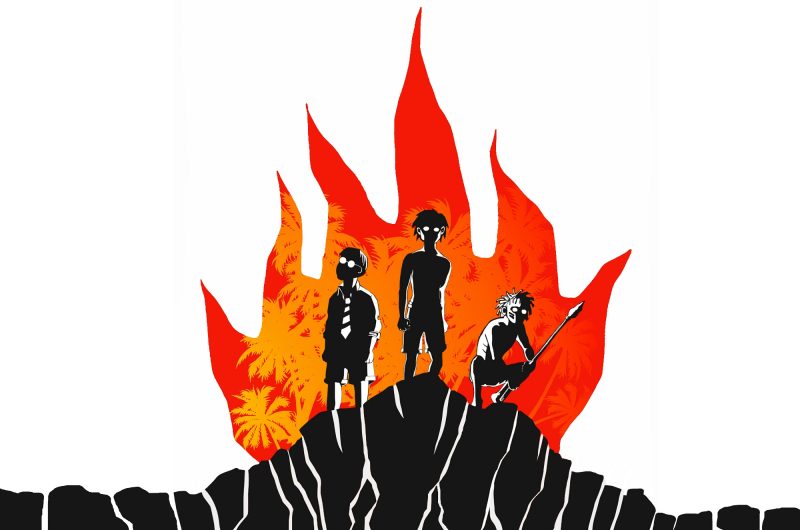Individuality: A Concept
The majority of the civilized population is adamant in their claim that they are faithful to their individuality, and a slave to no mentality; however, that said majority are often quick to jump at the prospect of participating in protests that often turn violent. Initially, the stranded boys in Lord of the Flies view the uninhabited island as a place of paradise and entertainment. However, the characters’ emotions concerning the island and each other gradually turn negative and violent. Through the characters in Lord of the Flies, William Golding proves how humans, when given the opportunity to escape the morals and consequences of society, are driven to abandon their individuality in order to be part of a larger whole.
Foremost, the characters in Lord of the Flies are always eager to assimilate into the larger group in order to achieve a sense of security. For example, William Golding states, “Piggy and Ralph, under the threat of the sky, found themselves eager to take a place in this demented but partly secure society” (Golding 152). During this scene, Ralph and Piggy, besides Simon, are the only boys out of the original group that have not succumbed to Jack’s tantalizing offer of safety through savagery. Piggy and Ralph, frightened and terribly alone in their faithfulness to their individuality, are compelled to shed that said individuality. William Golding also writes, “Some of the littulns started a ring on their own; and the complementary circles went round and round as though repetition would achieve safety of itself. There was the throb and stamp of a single organism” (Golding 152). Similar to the previously stated scene, the littulns, in a primal state of insecurity and fear, see assimilation and conformity as a means of achieving distorted security. In their most primeval states, the littulns see safety in the unity that barbarity allows for. Additionally, along with liberation from the dangers of society, savagery and thoughtless assimilation also allows one to escape the demons that reside in one’s own conscious.
Furthermore, there is the prospect of what the “mask” represents: freedom from the constricting, human conscious. For instance, William Golding illustrates, “He capered toward Bill, and the mask was a thing on its own, behind which Jack hid, liberated from shame and self-consciousness” (Golding 64). In this scene, Jack finds a false sense of solace in the amalgamation of charcoal and clay. This mask liberates him from his own consciousness, it allows him to detach himself from his individuality and his constricting sense of morals, and fully embrace the promise of conformity without the ever-persistent shadow of remorse. William Golding suggests that the rest of the boys are submissive in the face of brutality by stating, “The mask compelled them” (Golding 64). As displayed in this scene, when a witness to a strong sense of savagery and mindless-uniformity, one is compelled to join in with the others. In this example, Bill and the twins see Jack, adorned in his mask, and realize how liberated he is from all of his doubts. They see an opportunity to abandon their own individuality, along with the moral codes that have been conditioned into them by a society that is no longer present. When in possession of such a liberating power, one tends to take after Icarus and fly a little too close to the sun.
Finally, reluctant to admit their faults and accept the consequences, the boys rely on the enticing concept of group mentality to justify their brutality. Golding suggests that the boys are quick to abandon their individuality in favor of being free of consequences because, “There was that- that bloody dance” (Golding 156). As illustrated in this example, when confronted by Ralph, who is weighed down by a heavy conscious, Piggy immediately responds to the accusations of murder by stressing that the boys were scared, threatened, and most importantly, caught up in the moment of comradery. Piggy justifies their brutality and sheds some of his own guilt by blaming anything but the individual. Additionally, William Golding states, “You were outside. Outside the circle. You never really came in. Didn’t you see what we- what they did?” (Golding 157). In a state of extreme realization and remorse, Ralph initially comes to the conclusion that the circle of boys as a whole were to blame for the horrific act. He justifies that Piggy was not involved in the murder of Simon because Piggy had not fully assimilated into the demented ring of savages, proving how Ralph and the other boys are always quick to abandon their individuality in favor of being free of consequences.
In conclusion, William Golding illustrates how when mankind is presented the gift of liberation from their morals and the ramifications of society, people will always abandon their individuality in favor of being part of a larger whole. The alluring promise of liberation from the consequences of society and one’s own consciousness, as well as a sense of security, will ultimately compel mankind to relinquish their faithfulness to themselves. Though they may have convinced themselves of the opposite, mankind is only ever satisfied with themselves and the society around them when they are shackled to a mentality that is all-consuming.






